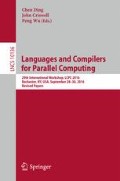Abstract
Current shared-memory systems can feature tens of processing elements. The old assumption that coarse-grain synchronization is enough in a shared-memory system thus becomes invalid. To efficiently take advantage of such systems, we propose to use fine grain synchronization, with event-driven multithreading. To illustrate our point, we study a naïve 5-point 2D stencil kernel. We provide several synchronization variants using our fine-grain multithreading environment, and compare it to a naïve coarse-grain implementation using OpenMP. We conducted experiments on three different many-core compute nodes, with speedups ranging from 1.2\(\times \) to 1.75\(\times \).
Access this chapter
Tax calculation will be finalised at checkout
Purchases are for personal use only
Notes
- 1.
Note that we do not claim that our own environment is better than OpenMP 4.
- 2.
Obviously, as we are writing directly using a runtime system API, the code has to be more verbose than its OpenMP counterpart.
References
Ancourt, C., Irigoin, F.: Scanning polyhedra with DO loops. SIGPLAN Not. 26(7), 39–50 (1991)
Bandishti, V., Pananilath, I., Bondhugula, U.: Tiling stencil computations to maximize parallelism. In: Proceedings of the International Conference on High Performance Computing, Networking, Storage and Analysis, SC 2012. IEEE Computer Society Press, Salt Lake City (2012)
Barik, R., et al.: The Habanero multicore software research project. In: Proceedings of the 24th ACM SIGPLAN Conference Companion on Object Oriented Programming Systems Languages and Applications, OOPSLA 2009. ACM, Orlando (2009)
Bertolacci, I.J., et al.: Parameterized diamond tiling for stencil computations with chapel parallel iterators. In: Proceedings of the 29th ACM on International Conference on Supercomputing, ICS 2015. ACM, Newport Beach (2015)
Blumofe, R.D., et al.: Cilk: an efficient multithreaded runtime system. J. Parallel Distrib. Comput. 37(1), 55–69 (1996)
OpenMP Architecture Review Board. OpenMP Application Program Interface version 4.0 (2013)
Christen, M., Schenk, O., Burkhart, H.: PATUS: a code generation and autotuning framework for parallel iterative stencil computations on modern microarchitectures. In: 2011 IEEE International Parallel Distributed Processing Symposium (IPDPS) (2011)
Dennis, J.B.: First version of a data flow procedure language. In: Robinet, B. (ed.) Programming Symposium. LNCS, vol. 19, pp. 362–376. Springer, Heidelberg (1974). doi:10.1007/3-540-06859-7_145
Gautier, T., et al.: XKaapi: a runtime system for data-flow task programming on heterogeneous architectures. In: 2013 IEEE 27th International Symposium on Parallel Distributed Processing (IPDPS) (2013)
Kamil, S., et al.: An auto-tuning framework for parallel multicore stencil computations. In: 2010 IEEE International Symposium on Parallel Distributed Processing (IPDPS) (2010)
Knobe, K.: Ease of use with concurrent collections (CnC). In: Hot Topics in Parallelism (2009)
Lauderdale, C., Khan, R.: Towards a codelet-based runtime for exascale computing: position paper. In: Proceedings of the 2nd International Workshop on Adaptive Self-Tuning Computing Systems for the Exafop Era, EXADAPT 2012. ACM, London (2012)
Lesniak, M.: PASTHA: parallelizing stencil calculations in Haskell. In: Proceedings of the 5th ACM SIGPLAN Workshop on Declarative Aspects of Multicore Programming, DAMP 2010. ACM, Madrid (2010)
Liu, C., Kulkarni, M.: Optimizing the LULESH stencil code using concurrent collections. In: Proceedings of the 5th International Workshop on Domain-Specific Languages and High-Level Frame-Works for High Performance Computing, WOLFHPC 2015. ACM, Austin (2015)
Mattson, T., et al.: OCR: the open community runtime interface. Technical report, June 2015. https://xstack.exascaletech.com/git/public
Muranushi, T., Makino, J.: Optimal temporal blocking for stencil computation. Procedia Comput. Sci. 51, 1303–1312 (2015). International Conference on Computational Science, ICCS 2015 Computational Science at the Gates of Nature
Schweizer, H., Besta, M., Hoefler, T.: Evaluating the cost of atomic operations on modern architectures. Technical report ETH Zurich, Department of Computer Science (2015)
Shrestha, S., Manzano, J., Marquez, A., Feo, J., Gao, G.R.: Jagged tiling for intra-tile parallelism and fine-grain multithreading. In: Brodman, J., Tu, P. (eds.) LCPC 2014. LNCS, vol. 8967, pp. 161–175. Springer, Heidelberg (2015). doi:10.1007/978-3-319-17473-0_11
Suettlerlein, J., Zuckerman, S., Gao, G.R.: An implementation of the codelet model. In: Wolf, F., Mohr, B., Mey, D. (eds.) Euro-Par 2013. LNCS, vol. 8097, pp. 633–644. Springer, Heidelberg (2013). doi:10.1007/978-3-642-40047-6_63
Tang, Y., et al.: The pochoir stencil compiler. In: Proceedings of the Twenty-Third Annual ACM Symposium on Parallelism in Algorithms and Architectures, SPAA 2011. ACM, San Jose (2011)
Zuckerman, S., et al.: Using a “codelet” program execution model for exascale machines: position paper. In: Proceedings of the 1st International Workshop on Adaptive Self-Tuning Computing Systems for the Exaflop Era, EXADAPT 2011. ACM, San Jose (2011)
Acknowledgments
This research is based upon work supported by the National Science Foundation, under awards XPS-1439165 and XPS-1439097.
Author information
Authors and Affiliations
Corresponding author
Editor information
Editors and Affiliations
Rights and permissions
Copyright information
© 2017 Springer International Publishing AG
About this paper
Cite this paper
Geng, T. et al. (2017). The Importance of Efficient Fine-Grain Synchronization for Many-Core Systems. In: Ding, C., Criswell, J., Wu, P. (eds) Languages and Compilers for Parallel Computing. LCPC 2016. Lecture Notes in Computer Science(), vol 10136. Springer, Cham. https://doi.org/10.1007/978-3-319-52709-3_16
Download citation
DOI: https://doi.org/10.1007/978-3-319-52709-3_16
Published:
Publisher Name: Springer, Cham
Print ISBN: 978-3-319-52708-6
Online ISBN: 978-3-319-52709-3
eBook Packages: Computer ScienceComputer Science (R0)

